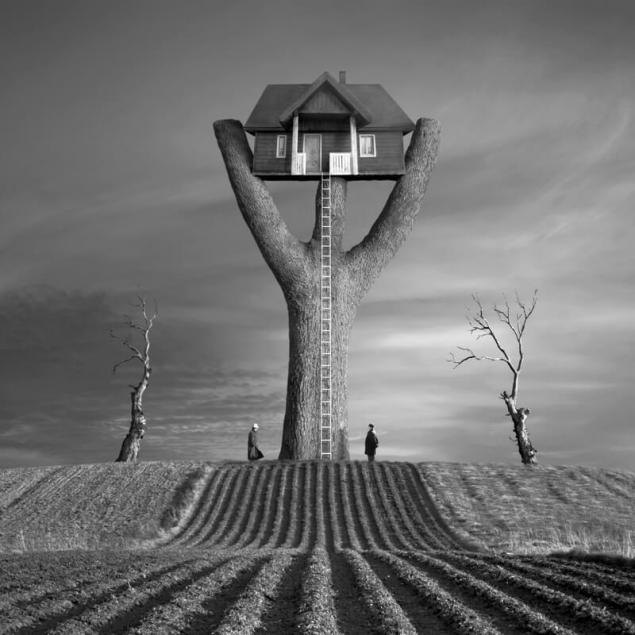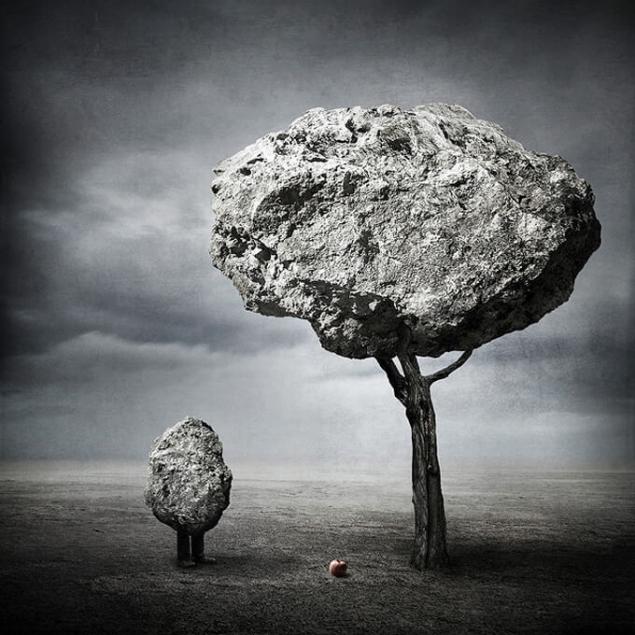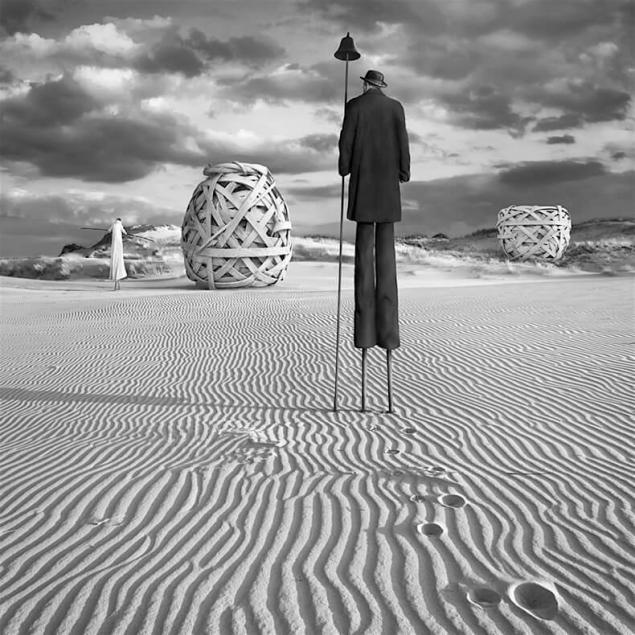463
"Where are you?" instead of "hello."
Dependence
“Where are you?” instead of “hello”; “what happened?” instead of “how are you?”; “I feel bad without you” instead of “I’m fine with you”; “you ruined my whole life” instead of “I need your support so much”; “I want to make you happy” instead of “I’m so happy with you.”
You can hear the addiction.Although few people pay attention to the meaning of what was said and notice a fine line between the words of love and the words-symptoms of a dependent relationship. You don’t have to be an expert to learn to distinguish between control and the desire to possess others.
A mother who “put her whole life on her son”; a wife who constantly “keeps her hand on the pulse” of her husband; a man who after the death of his wife sentences: “I have no more need to live.”
One of the aims of this book is to show that addiction is often disguised as love.Why is it confused with love, why does addiction prefer love?

Dariusz Klimczak
Addiction is defined by many psychologists as an obsessive state of irresistible attraction to something or someone. Such attraction is almost uncontrollable.
The attempt to give up the object of attraction leads to heavy, painful emotional, and sometimes physical experiences. But if no measures are taken to reduce addiction, it will progress and, in the end, can completely take over and subjugate a person’s life. At the same time, a person is in an altered state of consciousness, which allows him to escape from those problems of real life that seem intolerable to him.
This, most often hidden from consciousness, benefit and prevents you from giving up addiction, despite the fact that the cost of maintaining and exacerbating addiction can be the loss of relationships, health and even life.
Addiction is a personal deviation, a personal problem.According to some experts, it can be considered a disease. Often in the studies of physicians and psychologists, the emphasis is placed on the latter definition: dependence is understood as a disease, and its origin is seen in heredity, biochemistry, enzymes, hormones, etc.
And yet, in psychology, there are directions that relate to this problem differently. In his book, Codependency Liberation (M.: Class, 2006), Berry and Janey Winehold write, “The conventional medical model states that codependency is an inherited disease ... and incurable.” “We believe that codependency is an acquired disorder resulting from developmental arrest.”
We can also cite as an example the opinion of the domestic drug doctor, Professor Valentina Dmitrievna Moskalenko, whose books “Dependence: a family disease” (M.: Per Se, 2006) and “When there is too much love” (M.: Psychotherapy, 2007) also open not a medical but a psychological model, despite the fact that the author is a narcologist.
V.D. Moskalenko proposes to understand codependency in this way: “A codependent person is one who is completely absorbed in controlling the behavior of another person and does not care at all about satisfying his own vital needs.”
Two models—medical and psychological—understand the origins of addiction and related codependency differently.. At the center of the medical model is biochemistry and genes, at the center of the other is personality problems.
We will not deal with the question of the correlation of the two models. Let’s just say that both are right in some way. The medical model is necessary to understand the clinical aspect of addiction as a state of the body. The psychological model is necessary to understand how and where codependent relationships arise, how dependent personalities are formed in them, and what psychotherapeutic strategies can be built.
These two models can be seen as complementary rather than mutually exclusive.
Magical explanations of the origin of emotional dependence, such as the evil eye, spoilage, love spell, karmic connections, etc., which at one time was so fashionable to get carried away, will be ignored as contradicting our scientific, value and religious beliefs.
So we see thatdependence is defined in many different ways - as a disease, with the concept of symptoms and syndromes, as a special condition.In which a person fell as a result of psychological trauma or a lack of some relationship in the family. But it does not seem so important to define the concept of dependence as to understand the following:
One:A dependent person is one who is completely or most of his life oriented towards himself not directly, but indirectly through another; oriented - that is, depends on someone else's opinion, behavior, attitude, mood, etc.
And two:A dependent is someone who does not care about their real needs (physical and psychological), and therefore experiences constant tension due to the unsatisfaction of their own needs (this state in psychology is called frustration). Such a person does not know what he wants, does not try to realize his own responsibility for the satisfaction of his needs, and lives, as it were, in spite of himself, for the evil of himself, if so to say, expecting or demanding care from others.
The word “addiction” (addictive behavior) is now used in a variety of combinations:chemical dependence (alcoholism, drug addiction), drug dependence, shopaholism, dependence on food (eating disorders), adrenaline dependence (dependence on thrills), dependence on work (workaholism), from play (gambling) or computer, etc.
The fact that all these addictions are of great interest to specialists, are studied in detail and described, is explained simply - any kind of addiction has a huge impact on the life of the person who suffers from it, and on the lives of those who enter his environment.
In the psychological literature, there is a special term “codependency”, describing dependence not on alcohol, drugs, etc., but on the most dependent loved one. In this case, “the codependent’s own identity—his self—is replaced by the personality and problems of the person on whom he depends.”
Not only scientists are engaged in the problem of prevention and overcoming addiction - recently, self-help groups of alcoholics anonymous, drug addicts, gamblers, codependents are multiplying (for example, there are groups "Adult Children of Alcoholics", ALANON for relatives of drug addicts, etc.).
No social stratum, no culture can boast of the absence of manifestations in one form or another of various dependencies. So, few people know that in some dioceses of the Russian Orthodox Church groups of alcoholics anonymous for clergy are created, because this problem has long ceased to be “personal”, “private” – it concerns everyone.
Another important aspect to consider when discussing addiction is the influence of social stereotypes that support and justify addictive behavior.
For example, respect for workaholism: “What a decent person!” Burned at work!; justification of alcoholism: "He has such a hard life / difficult job / bad wife - how can he not drink!"; admiration for sexual addiction: "A real man, macho, alpha male!" and alcoholism: "A strong man! How much can he drink!; chanting codependent relationships: “I am you, you are me, and we don’t need anyone” (popular song), etc.
Personally immature (infantile) person is difficult to resist such “hypnosis of the conventional”, easier to swim with the flow, to be “in trend”. In our practice of counseling, we constantly have to deal directly or indirectly with the topic of addiction and codependency.
Analyzing the experience accumulated by us and other psychologists, we would like to understand how, when and under what conditions a person’s tendency to addiction is formed and develops. In this book, we will confine ourselves to describing the emotional dependence on another person and try to outline directions of research that will give food for further reflection.

Dariusz Klimczak
Conditions for the formation of dependency
What factors contribute to the emergence of codependent behavior and the formation of a dependent personality?
There are many such factors and they can all be divided into several categories:historical- concerns everyone;social factorsconcerns certain sectors of society;familialrelate to the history and life of my family; andpersonalIt's just about my experience.
Regarding the genetic predicament, the “innateness” of codependent behavior, we have not seen serious scientific studies – scientists pay more attention to chemical addictions than emotional ones.
We assume that rather we can say that the predisposition to emotional dependence is absorbed by the child “with the mother’s milk”, that is, it is transmitted not at the genetic level, but through behavior, emotional reactions and ways of building relationships in the family, where the child grows up and learns the world. The genetic factor is not considered here.
Historical factors in different peoples, these factors may take different forms and have different causes, but their essence will be similar.
The formation of codependent behavior leads to the distortion of the child’s childhood, which always occurs when society as a whole comprehends some tragedies. These are wars and revolutions, tragedies of natural order (earthquakes, volcanic eruptions, floods, etc.), epidemics, social changes and economic crises, and, of course, such shocks and tragedies that took place in the fate of our Fatherland – persecution, persecution, genocide, repression, etc.
There is hardly a family in our country whose members can say that no one in the family was repressed, dekulakized, not under suspicion or under investigation. In some families, up to 90 percent of not only men but also women were repressed. And in such a family, in such a family, several generations bear the consequences of the terrible events experienced. There is hardly a family in Russia that did not suffer the tragedy of the loss of a man in the Great Patriotic War, and now the wars of Afghanistan, Chechnya and others have been added to this. These are historical factors that, to some extent, are present in the life of any people.
In difficult, tragic periods of history, nations and families come together to survive and become very dependent on each other. People who have been accustomed to survival strategies since childhood find it difficult to adjust to a “peaceful” life. Many continue to fight or fear, hide, defend, look for enemies where they are not, sometimes even among their relatives. When trust in the world is undermined, people find it hard to trust. But the loneliness of death is like (in hard times one cannot survive).
The survival strategy dictates its own laws, one of which is “codependent relationships are profitable.” That’s it: you are bad and not good without you.In fairness, it should be noted that the reaction of the family to stressful situations depends not only on the type and strength of stress, but also on the relationships that have developed in the family.
There are healthy families with sufficient psychological and spiritual resources to help survive almost any crisis. And the childhood of a child in such a family can be quite happy, despite all the difficulties experienced (of course, except for situations of mortal danger, as well as the loss of one or both parents).
Social factors:social situation, social stereotypes and attitudes, norms and rules, the system of values adopted in society - all these factors can contribute or, on the contrary, interfere with the formation and development of the individual.
In Russia, for a long time it was accepted that both parents should work, and children were brought up in preschool institutions from an early age. The norm of early socialization of children was morally justified: “Collectivism is more important than individual development of the individual.” In Soviet society, such qualities as obedience, obedience, lack of initiative were encouraged, it was calmer to “be like everyone else and not show up.” Careless, carefree childhood was not welcomed, as many thought that the earlier the child is taught responsibility and the earlier he learns the hardships of life, the easier it will be for him to adapt to the complexities of adult (joyless, exhausting) existence. Modern psychologists say the opposite: a person deprived of a joyful, carefree childhood is very difficult to grow up.
Another example: in Soviet times, it was believed that it was enough to have one child to provide it with all the “best” (usually material) that parents were deprived of in their childhood. Families were detocentric: "All the best for the children!" Many children were condemned: “Why breed poverty?”, abortion was justified, although later the government began to encourage the birth of children: benefits for large children, the title of “Mother-heroine”, etc.
Children in such social settings tended to grow up infantile and selfish, with inadequate (hyper- or hypo-) responsibility, which in turn was the "foundation" for the development of various kinds of addictions and codependent relationships. Today, social conditions and moral guidelines are changing, becoming perhaps more diverse, even polar. But it should be borne in mind that social factors, unlike historical ones, do not affect all families.
In society there are many different social strata and groups, which in the same historical period may be in different social and economic circumstances, to follow different norms and rules. War, epidemic, natural disasters do not spare anyone, and the rules adopted in a particular society do not concern everyone.
The third group of factors is family-birth.The historical epoch and the social structure of society have a great influence on the life of the family and family. Under the influence of external conditions, family scenarios and rules are formed, which in turn affect the development of a particular person, primarily on the psychological health of childhood.
The concept of “childhood” is used in the broad sense of the word – not an example of one child or one family, namely, as a whole. Family factors affecting childhood are understandable. If in the life of a child, his mother and father are happy with each other (simply in the universal sense), and nothing plunges them into depression, nor into fears and worries for their home, for the future of their child, for their parents, if to one degree or another the married couple feels stability, the joy of their being, the joy of their marriage and parenthood, then the child has the conditions for the dynamic and healthy development of his personality.
On the contrary, as soon as anxiety, apprehension, and fear spread in a society, then one can hardly say that any family that will relate to this community can have a happy (psychologically speaking) childhood. Few people can analyze their childhood and say that there were no such events. Social cataclysms lead to an increased level of anxiety in women, to tension, which results in inadequate aggressiveness or, on the contrary, complete passivity in men.
The child sees an upset, constantly worried mother, a father, tearing anger at family members or going into a binge from his own powerlessness and inability to change something. Looking at such a joyless picture, it is difficult for children to remain carefree and cheerful. There is a feeling of guilt for what is unclear, the desire to save mom and dad and the prohibition on your own happiness - you can not afford to be happy when your family was not happy.
A poor social environment causes fear for many. And that fear is transmitted to children. We can see from our children how they are afraid of what we are, even though there is no objective reason for their fear. And it's an anxiety that's passed down from generation to generation that we infect our children with.
But as we have written above,Not everyone responds to the same events and conditions.Of course, we have different families, different ancestral systems, having their own unique experience of living certain events – happy or tragic. Families differ in many criteria and parameters: in composition, number of children, health, belonging to the social stratum and professional community, moral and value guidelines, etc., etc., etc.
The fate of each family member in some way affects the lives of the whole family and individuals. Early deaths, captivity, deportation, executions, suicides, abortions, abandoned children, rape, divorce, betrayal, criminally prosecuted crimes (theft, murder, etc.), imprisonment, alcoholism, drug addiction, mental illness – all this leaves a heavy imprint on many generations.
The most difficult thing for posterity is to accept into one’s heart without condemnation and curses all members of one’s family and to thank them for the life they have received at a very high price. The works of Anne Schutzenberger, Bert Hellinger, Ekaterina Mikhailova, Lyudmila Petranovskaya and many other psychologists show what complex interweavings in the fate of a person can affect such facts of generic life.
But there is also a joyful inheritance: strong happy marriages, love for children, vitality and optimism, feats, strong faith, virtuous life, priestly service, good fame of one or more family members. Such a legacy not only allows you to be proud of your belonging to your family, but also gives strength, inspires.

In addition to the history of the family life, the family-birth factors include family scenarios.It contains established traditions and expectations for each family member and is passed down from generation to generation, as well as anti-scenarios – attempts (usually unsuccessful) to avoid the scenario set by previous generations.
For example, a typical female scenario for our society: “to marry without love – out of pity (or fear of loneliness) for the first one who “turned over”, drew attention, and put his life on the salvation and admonition of the bad husband, constantly sacrificing his needs and the well-being of children.”
In this case, for example, the daughter of such a woman will try to implement one of the anti-scenarios: not to get married; to divorce as soon as something begins to dissatisfy the relationship; to marry a person who himself will begin to re-educate and remake it to his ideal, etc., in any case - to end life alone with resentment of fate.
The form in the anti-scenario changes, but the essence remains – disrespect for the person (his own and partner), inability to love, unwillingness to take adequate responsibility – all this leads to codependent relationships.
As Anne Schutzenberger wrote, “We continue the chain of generations and pay off the debts of the past until the slate is clean.” Invisible loyalty, regardless of our desire, regardless of our awareness, pushes us to repeat pleasant experiences or traumatic events, or unjust and even tragic death, or its echoes.
But we will not be so categorical – it is really useless to fight family scenarios, but you can analyze them, take the best (and there is something valuable in each scenario) and at least change the essence of them.
Family-birth factors can also include family rules.vowels and unspoken, known to all, set by culture, as well as unique to each individual family, known only to members of this family.
Family rules, as well as interaction stereotypes and family myths, are perfectly described in Anna Varga’s book on family systemic psychotherapy: “Rules are how a family decides to rest and run its household, how it will spend money, and who exactly can do it in the family and who does not; who buys, who does laundry, who cooks, who praises and who mostly scolds; who forbids and who allows it.” In short, it is the distribution of family roles and functions, certain places in the family hierarchy, what is generally allowed and what is not, what is good and what is bad. The law of homeostasis requires the preservation of family rules in a permanent form. Changing family rules is a painful process for family members. Breaking the rules is a dangerous thing, very dramatic.
Examples of family rules include many:“There were no lazy people in our family, it is impossible to rest, or it is possible only when everything is done (that is, never).” “The young must obey, always do as the elders say, never argue with them.” Men should not show their feelings, they should not be afraid, cry, be weak (that is, alive). “Another’s interests are always more important than your own – die, but help your comrade.”
The offender is waiting for “punitive sanctions”, up to excommunication from his family. Changing family rules is difficult, though possible. Every rule contains some truth, so do not abandon it altogether. The trouble is that rules taken literally, taken without awareness and used without reasoning can do more harm than good, and sometimes make life unbearable.
Family rules and attitudes are important to understand, treat them with healthy criticism and use them adequately.Otherwise, blindly following family rules, you can quietly find yourself in a dependent relationship.
We all belong to our family (even those who do not know their birth parents), all of us are somehow connected by invisible threads, blood ties with our ancestors, near and far. And we cannot deny that inclusion in the birth system is a very important factor that undoubtedly affects the formation of a dependent personality.
The fourth group of factors – personal experience of a particular personSo unique, sometimes bizarre. Not only are the conditions in which a person develops unique, but the subjective perception of reality is completely unpredictable. Different people perceive the same events in a special way, interpreting them in their own way and correlating with the same unique personal experience already acquired at the time of the event.
Moreover, the same person can react to the same situation in different ways, depending on their health, mood and other things. He may always remember what happened as a misfortune that broke his whole life, or as a not very pleasant episode from childhood.
It is impossible to predict how a person will react to a particular event and what consequences it will have in his later life. And we can only post facto assume that this has affected me in this way, and analyze how it affected the formation of my personality. About the other person, our guesses will also remain only guesses, because the search for hard causal relationships is an attempt to simplify life in order to take control of it.
Therefore, when we describe any psychological patterns, it is good to remember that life is much more complex than we would like it to be. And the miracle should not be forgotten. It is important to leave a place for God in the logic of life.
In the endless search for the guilty “why am I like this?” one must realize that the formation of us as dependent individuals is not only our fault or someone else’s (parents, school, society) but also our trouble.
This is our destiny, which is God’s providence and our own choice. And that choice sometimes doesn't look like a choice at all, but like an inevitable necessity that happens to us.
We can be very bitterly disappointed when we come to this conclusion: everything led to me becoming that (or becoming that). At this point, instead of asking yourself, “Why should I do this?” you can try asking yourself, “Why should I do this?”: Why did what happened to me, why was I born at this time, in this country, in this family?” What is important and valuable in my unique experience? How can I use my experience for the benefit of myself and others?
It's a mature approach to a creative task called "me and my life."How joyful it is to communicate with a person who, for example, gave up alcohol addiction for many years, and now talks about a solid experience of sobriety and how he leads a self-help group for Alcoholics Anonymous, helping others to get out of the bonds of addiction.
As the well-known psychologist James Hollis noted, “Early childhood experiences, and later the influence of culture, led us to an inner disconnection with the self.” Only by reconnecting with our inner truth can we stand firmly on our feet and return to the right path. We need to separate ourselves from the real ones we have become, from the actual but false sense of self. Without a significant effort to perform the painful act of awareness, the person is still identified with the trauma.”
"I am not what happened to me; it is who I want to be.This is the phrase, according to J. Hollis must constantly resonate in the mind of anyone who does not want to remain a prisoner of his fate.
Priests and psychologists often have to engage in rehabilitation, so to speak. And in confession, in private conversation, and in psychological counseling, it is necessary to rehabilitate before a person himself and his own past, which he is ready to curse, ready to hate his childhood, his family, his parents. And our task here is not to say "white" on "black" or "white" on bad to say that it was good, joyful or to justify any crime.
Our task is probably to help a person gain the strength and courage to acknowledge and accept everything that has happened to him, including his own actions, steps and choices. It is perhaps the most difficult thing for a man to recognize his freedom, although perhaps he did not think it was his.
To avoid responsibility, we sometimes refuse to see our free choice, justifying ourselves by the fact that we were forced, “life forced”, “events were stronger”, “it was impossible to do otherwise”.
But there is a question to myself, to which it is sometimes scary to give an honest answer: “Did I really have no other way out or did I not want to see another way out?” Or maybe there was another way out, but it seemed to me more dangerous, complicated, unpredictable? Perhaps there was some, even if unconscious, gain in the way I chose?

Dariusz Klimczak
Recognizing and accepting yourself and your life is sometimes difficult.We can’t rewrite the history of our lives, but as adults, we can change how we feel about what happened to us.
Spiritually speaking,Accepting my destiny is a courageous step of liberation, because after accepting it, I discover freedom.. After all, as soon as I agree with something in life, accept it as a fact of my life, I become the “owner” of this event, which means that I can learn lessons and make some changes – at least in my emotional attitude to my own memories.
It happens that a person wants to cross out some pages of his life, forget some traumatic or dramatic events like a terrible dream. But by dissociating ourselves from our past, we get rid not only of the pain and trauma, but also of the strength that we gained when we lived through difficult life situations, from the crisis, from the strength that helped us survive.
Along the way, we devalue our experience at the cost of tears, suffering, mistakes, disappointments. Surely.Any challenge is a chance to understand something in life, to learn something new about yourself, to grow up.. How a person uses this opportunity is his personal choice and responsibility. Someone can break down, be angry at the whole world, and someone will become kinder, more attentive, more tolerant.
Looking back on your life path, it is important to be able to recognize: “No, it’s not just what happened to me; it’s what I’ve partly caused now by revising the price and value of this experience for me and changing my attitude to these events and finding new meaning in them.”
When I accept my destiny, I am freed from what seemed to me captivity and unfreedom.That’s why we need this analysis – we need an idea of what different factors determine the conditions for the formation of dependent or free behavior in us.
But since, after all, we speak of love as a way of life, a way of being that gives a person a different way, free from dependence, a different opportunity, we must say that no matter how “bad” fate treats a person, from the Christian point of view, a person is always a living soul. And so there's always love in him.
He can find this love in himself, join it, he can begin to live it at any moment of his life. Remember the examples of a meeting with love given by Leo Tolstoy in the description of the death of Prince Andrei Bolkonsky and in the opening of Pierre Bezukhov in captivity. Oblomov, who spent most of his life pointlessly on the couch in a dirty coat, suddenly talks about the light that is hidden in the soul!
Many people talk about this light - it indicates that a person has love, and it always has.It is hidden, buried very deep in the depths of the soul. But there is no such person, whom God would not give at birth love, and there was not. This means that the individual has another path, not the path of building codependent relationships, which he accepts as a surrogate, but the path of love, in which he opens himself to unlimited generosity and freedom. published
“Falling in Love, Love, Addiction” by Andrei Lorgus and Olga Krasnikova
P.S. And remember, just changing our consumption – together we change the world!
Source: thezis.ru/tyi-gde-vmesto-zdravstvuy.html
“Where are you?” instead of “hello”; “what happened?” instead of “how are you?”; “I feel bad without you” instead of “I’m fine with you”; “you ruined my whole life” instead of “I need your support so much”; “I want to make you happy” instead of “I’m so happy with you.”
You can hear the addiction.Although few people pay attention to the meaning of what was said and notice a fine line between the words of love and the words-symptoms of a dependent relationship. You don’t have to be an expert to learn to distinguish between control and the desire to possess others.
A mother who “put her whole life on her son”; a wife who constantly “keeps her hand on the pulse” of her husband; a man who after the death of his wife sentences: “I have no more need to live.”
One of the aims of this book is to show that addiction is often disguised as love.Why is it confused with love, why does addiction prefer love?

Dariusz Klimczak
Addiction is defined by many psychologists as an obsessive state of irresistible attraction to something or someone. Such attraction is almost uncontrollable.
The attempt to give up the object of attraction leads to heavy, painful emotional, and sometimes physical experiences. But if no measures are taken to reduce addiction, it will progress and, in the end, can completely take over and subjugate a person’s life. At the same time, a person is in an altered state of consciousness, which allows him to escape from those problems of real life that seem intolerable to him.
This, most often hidden from consciousness, benefit and prevents you from giving up addiction, despite the fact that the cost of maintaining and exacerbating addiction can be the loss of relationships, health and even life.
Addiction is a personal deviation, a personal problem.According to some experts, it can be considered a disease. Often in the studies of physicians and psychologists, the emphasis is placed on the latter definition: dependence is understood as a disease, and its origin is seen in heredity, biochemistry, enzymes, hormones, etc.
And yet, in psychology, there are directions that relate to this problem differently. In his book, Codependency Liberation (M.: Class, 2006), Berry and Janey Winehold write, “The conventional medical model states that codependency is an inherited disease ... and incurable.” “We believe that codependency is an acquired disorder resulting from developmental arrest.”
We can also cite as an example the opinion of the domestic drug doctor, Professor Valentina Dmitrievna Moskalenko, whose books “Dependence: a family disease” (M.: Per Se, 2006) and “When there is too much love” (M.: Psychotherapy, 2007) also open not a medical but a psychological model, despite the fact that the author is a narcologist.
V.D. Moskalenko proposes to understand codependency in this way: “A codependent person is one who is completely absorbed in controlling the behavior of another person and does not care at all about satisfying his own vital needs.”
Two models—medical and psychological—understand the origins of addiction and related codependency differently.. At the center of the medical model is biochemistry and genes, at the center of the other is personality problems.
We will not deal with the question of the correlation of the two models. Let’s just say that both are right in some way. The medical model is necessary to understand the clinical aspect of addiction as a state of the body. The psychological model is necessary to understand how and where codependent relationships arise, how dependent personalities are formed in them, and what psychotherapeutic strategies can be built.
These two models can be seen as complementary rather than mutually exclusive.
Magical explanations of the origin of emotional dependence, such as the evil eye, spoilage, love spell, karmic connections, etc., which at one time was so fashionable to get carried away, will be ignored as contradicting our scientific, value and religious beliefs.
So we see thatdependence is defined in many different ways - as a disease, with the concept of symptoms and syndromes, as a special condition.In which a person fell as a result of psychological trauma or a lack of some relationship in the family. But it does not seem so important to define the concept of dependence as to understand the following:
One:A dependent person is one who is completely or most of his life oriented towards himself not directly, but indirectly through another; oriented - that is, depends on someone else's opinion, behavior, attitude, mood, etc.
And two:A dependent is someone who does not care about their real needs (physical and psychological), and therefore experiences constant tension due to the unsatisfaction of their own needs (this state in psychology is called frustration). Such a person does not know what he wants, does not try to realize his own responsibility for the satisfaction of his needs, and lives, as it were, in spite of himself, for the evil of himself, if so to say, expecting or demanding care from others.
The word “addiction” (addictive behavior) is now used in a variety of combinations:chemical dependence (alcoholism, drug addiction), drug dependence, shopaholism, dependence on food (eating disorders), adrenaline dependence (dependence on thrills), dependence on work (workaholism), from play (gambling) or computer, etc.
The fact that all these addictions are of great interest to specialists, are studied in detail and described, is explained simply - any kind of addiction has a huge impact on the life of the person who suffers from it, and on the lives of those who enter his environment.
In the psychological literature, there is a special term “codependency”, describing dependence not on alcohol, drugs, etc., but on the most dependent loved one. In this case, “the codependent’s own identity—his self—is replaced by the personality and problems of the person on whom he depends.”
Not only scientists are engaged in the problem of prevention and overcoming addiction - recently, self-help groups of alcoholics anonymous, drug addicts, gamblers, codependents are multiplying (for example, there are groups "Adult Children of Alcoholics", ALANON for relatives of drug addicts, etc.).
No social stratum, no culture can boast of the absence of manifestations in one form or another of various dependencies. So, few people know that in some dioceses of the Russian Orthodox Church groups of alcoholics anonymous for clergy are created, because this problem has long ceased to be “personal”, “private” – it concerns everyone.
Another important aspect to consider when discussing addiction is the influence of social stereotypes that support and justify addictive behavior.
For example, respect for workaholism: “What a decent person!” Burned at work!; justification of alcoholism: "He has such a hard life / difficult job / bad wife - how can he not drink!"; admiration for sexual addiction: "A real man, macho, alpha male!" and alcoholism: "A strong man! How much can he drink!; chanting codependent relationships: “I am you, you are me, and we don’t need anyone” (popular song), etc.
Personally immature (infantile) person is difficult to resist such “hypnosis of the conventional”, easier to swim with the flow, to be “in trend”. In our practice of counseling, we constantly have to deal directly or indirectly with the topic of addiction and codependency.
Analyzing the experience accumulated by us and other psychologists, we would like to understand how, when and under what conditions a person’s tendency to addiction is formed and develops. In this book, we will confine ourselves to describing the emotional dependence on another person and try to outline directions of research that will give food for further reflection.

Dariusz Klimczak
Conditions for the formation of dependency
What factors contribute to the emergence of codependent behavior and the formation of a dependent personality?
There are many such factors and they can all be divided into several categories:historical- concerns everyone;social factorsconcerns certain sectors of society;familialrelate to the history and life of my family; andpersonalIt's just about my experience.
Regarding the genetic predicament, the “innateness” of codependent behavior, we have not seen serious scientific studies – scientists pay more attention to chemical addictions than emotional ones.
We assume that rather we can say that the predisposition to emotional dependence is absorbed by the child “with the mother’s milk”, that is, it is transmitted not at the genetic level, but through behavior, emotional reactions and ways of building relationships in the family, where the child grows up and learns the world. The genetic factor is not considered here.
Historical factors in different peoples, these factors may take different forms and have different causes, but their essence will be similar.
The formation of codependent behavior leads to the distortion of the child’s childhood, which always occurs when society as a whole comprehends some tragedies. These are wars and revolutions, tragedies of natural order (earthquakes, volcanic eruptions, floods, etc.), epidemics, social changes and economic crises, and, of course, such shocks and tragedies that took place in the fate of our Fatherland – persecution, persecution, genocide, repression, etc.
There is hardly a family in our country whose members can say that no one in the family was repressed, dekulakized, not under suspicion or under investigation. In some families, up to 90 percent of not only men but also women were repressed. And in such a family, in such a family, several generations bear the consequences of the terrible events experienced. There is hardly a family in Russia that did not suffer the tragedy of the loss of a man in the Great Patriotic War, and now the wars of Afghanistan, Chechnya and others have been added to this. These are historical factors that, to some extent, are present in the life of any people.
In difficult, tragic periods of history, nations and families come together to survive and become very dependent on each other. People who have been accustomed to survival strategies since childhood find it difficult to adjust to a “peaceful” life. Many continue to fight or fear, hide, defend, look for enemies where they are not, sometimes even among their relatives. When trust in the world is undermined, people find it hard to trust. But the loneliness of death is like (in hard times one cannot survive).
The survival strategy dictates its own laws, one of which is “codependent relationships are profitable.” That’s it: you are bad and not good without you.In fairness, it should be noted that the reaction of the family to stressful situations depends not only on the type and strength of stress, but also on the relationships that have developed in the family.
There are healthy families with sufficient psychological and spiritual resources to help survive almost any crisis. And the childhood of a child in such a family can be quite happy, despite all the difficulties experienced (of course, except for situations of mortal danger, as well as the loss of one or both parents).
Social factors:social situation, social stereotypes and attitudes, norms and rules, the system of values adopted in society - all these factors can contribute or, on the contrary, interfere with the formation and development of the individual.
In Russia, for a long time it was accepted that both parents should work, and children were brought up in preschool institutions from an early age. The norm of early socialization of children was morally justified: “Collectivism is more important than individual development of the individual.” In Soviet society, such qualities as obedience, obedience, lack of initiative were encouraged, it was calmer to “be like everyone else and not show up.” Careless, carefree childhood was not welcomed, as many thought that the earlier the child is taught responsibility and the earlier he learns the hardships of life, the easier it will be for him to adapt to the complexities of adult (joyless, exhausting) existence. Modern psychologists say the opposite: a person deprived of a joyful, carefree childhood is very difficult to grow up.
Another example: in Soviet times, it was believed that it was enough to have one child to provide it with all the “best” (usually material) that parents were deprived of in their childhood. Families were detocentric: "All the best for the children!" Many children were condemned: “Why breed poverty?”, abortion was justified, although later the government began to encourage the birth of children: benefits for large children, the title of “Mother-heroine”, etc.
Children in such social settings tended to grow up infantile and selfish, with inadequate (hyper- or hypo-) responsibility, which in turn was the "foundation" for the development of various kinds of addictions and codependent relationships. Today, social conditions and moral guidelines are changing, becoming perhaps more diverse, even polar. But it should be borne in mind that social factors, unlike historical ones, do not affect all families.
In society there are many different social strata and groups, which in the same historical period may be in different social and economic circumstances, to follow different norms and rules. War, epidemic, natural disasters do not spare anyone, and the rules adopted in a particular society do not concern everyone.
The third group of factors is family-birth.The historical epoch and the social structure of society have a great influence on the life of the family and family. Under the influence of external conditions, family scenarios and rules are formed, which in turn affect the development of a particular person, primarily on the psychological health of childhood.
The concept of “childhood” is used in the broad sense of the word – not an example of one child or one family, namely, as a whole. Family factors affecting childhood are understandable. If in the life of a child, his mother and father are happy with each other (simply in the universal sense), and nothing plunges them into depression, nor into fears and worries for their home, for the future of their child, for their parents, if to one degree or another the married couple feels stability, the joy of their being, the joy of their marriage and parenthood, then the child has the conditions for the dynamic and healthy development of his personality.
On the contrary, as soon as anxiety, apprehension, and fear spread in a society, then one can hardly say that any family that will relate to this community can have a happy (psychologically speaking) childhood. Few people can analyze their childhood and say that there were no such events. Social cataclysms lead to an increased level of anxiety in women, to tension, which results in inadequate aggressiveness or, on the contrary, complete passivity in men.
The child sees an upset, constantly worried mother, a father, tearing anger at family members or going into a binge from his own powerlessness and inability to change something. Looking at such a joyless picture, it is difficult for children to remain carefree and cheerful. There is a feeling of guilt for what is unclear, the desire to save mom and dad and the prohibition on your own happiness - you can not afford to be happy when your family was not happy.
A poor social environment causes fear for many. And that fear is transmitted to children. We can see from our children how they are afraid of what we are, even though there is no objective reason for their fear. And it's an anxiety that's passed down from generation to generation that we infect our children with.
But as we have written above,Not everyone responds to the same events and conditions.Of course, we have different families, different ancestral systems, having their own unique experience of living certain events – happy or tragic. Families differ in many criteria and parameters: in composition, number of children, health, belonging to the social stratum and professional community, moral and value guidelines, etc., etc., etc.
The fate of each family member in some way affects the lives of the whole family and individuals. Early deaths, captivity, deportation, executions, suicides, abortions, abandoned children, rape, divorce, betrayal, criminally prosecuted crimes (theft, murder, etc.), imprisonment, alcoholism, drug addiction, mental illness – all this leaves a heavy imprint on many generations.
The most difficult thing for posterity is to accept into one’s heart without condemnation and curses all members of one’s family and to thank them for the life they have received at a very high price. The works of Anne Schutzenberger, Bert Hellinger, Ekaterina Mikhailova, Lyudmila Petranovskaya and many other psychologists show what complex interweavings in the fate of a person can affect such facts of generic life.
But there is also a joyful inheritance: strong happy marriages, love for children, vitality and optimism, feats, strong faith, virtuous life, priestly service, good fame of one or more family members. Such a legacy not only allows you to be proud of your belonging to your family, but also gives strength, inspires.

In addition to the history of the family life, the family-birth factors include family scenarios.It contains established traditions and expectations for each family member and is passed down from generation to generation, as well as anti-scenarios – attempts (usually unsuccessful) to avoid the scenario set by previous generations.
For example, a typical female scenario for our society: “to marry without love – out of pity (or fear of loneliness) for the first one who “turned over”, drew attention, and put his life on the salvation and admonition of the bad husband, constantly sacrificing his needs and the well-being of children.”
In this case, for example, the daughter of such a woman will try to implement one of the anti-scenarios: not to get married; to divorce as soon as something begins to dissatisfy the relationship; to marry a person who himself will begin to re-educate and remake it to his ideal, etc., in any case - to end life alone with resentment of fate.
The form in the anti-scenario changes, but the essence remains – disrespect for the person (his own and partner), inability to love, unwillingness to take adequate responsibility – all this leads to codependent relationships.
As Anne Schutzenberger wrote, “We continue the chain of generations and pay off the debts of the past until the slate is clean.” Invisible loyalty, regardless of our desire, regardless of our awareness, pushes us to repeat pleasant experiences or traumatic events, or unjust and even tragic death, or its echoes.
But we will not be so categorical – it is really useless to fight family scenarios, but you can analyze them, take the best (and there is something valuable in each scenario) and at least change the essence of them.
Family-birth factors can also include family rules.vowels and unspoken, known to all, set by culture, as well as unique to each individual family, known only to members of this family.
Family rules, as well as interaction stereotypes and family myths, are perfectly described in Anna Varga’s book on family systemic psychotherapy: “Rules are how a family decides to rest and run its household, how it will spend money, and who exactly can do it in the family and who does not; who buys, who does laundry, who cooks, who praises and who mostly scolds; who forbids and who allows it.” In short, it is the distribution of family roles and functions, certain places in the family hierarchy, what is generally allowed and what is not, what is good and what is bad. The law of homeostasis requires the preservation of family rules in a permanent form. Changing family rules is a painful process for family members. Breaking the rules is a dangerous thing, very dramatic.
Examples of family rules include many:“There were no lazy people in our family, it is impossible to rest, or it is possible only when everything is done (that is, never).” “The young must obey, always do as the elders say, never argue with them.” Men should not show their feelings, they should not be afraid, cry, be weak (that is, alive). “Another’s interests are always more important than your own – die, but help your comrade.”
The offender is waiting for “punitive sanctions”, up to excommunication from his family. Changing family rules is difficult, though possible. Every rule contains some truth, so do not abandon it altogether. The trouble is that rules taken literally, taken without awareness and used without reasoning can do more harm than good, and sometimes make life unbearable.
Family rules and attitudes are important to understand, treat them with healthy criticism and use them adequately.Otherwise, blindly following family rules, you can quietly find yourself in a dependent relationship.
We all belong to our family (even those who do not know their birth parents), all of us are somehow connected by invisible threads, blood ties with our ancestors, near and far. And we cannot deny that inclusion in the birth system is a very important factor that undoubtedly affects the formation of a dependent personality.
The fourth group of factors – personal experience of a particular personSo unique, sometimes bizarre. Not only are the conditions in which a person develops unique, but the subjective perception of reality is completely unpredictable. Different people perceive the same events in a special way, interpreting them in their own way and correlating with the same unique personal experience already acquired at the time of the event.
Moreover, the same person can react to the same situation in different ways, depending on their health, mood and other things. He may always remember what happened as a misfortune that broke his whole life, or as a not very pleasant episode from childhood.
It is impossible to predict how a person will react to a particular event and what consequences it will have in his later life. And we can only post facto assume that this has affected me in this way, and analyze how it affected the formation of my personality. About the other person, our guesses will also remain only guesses, because the search for hard causal relationships is an attempt to simplify life in order to take control of it.
Therefore, when we describe any psychological patterns, it is good to remember that life is much more complex than we would like it to be. And the miracle should not be forgotten. It is important to leave a place for God in the logic of life.
In the endless search for the guilty “why am I like this?” one must realize that the formation of us as dependent individuals is not only our fault or someone else’s (parents, school, society) but also our trouble.
This is our destiny, which is God’s providence and our own choice. And that choice sometimes doesn't look like a choice at all, but like an inevitable necessity that happens to us.
We can be very bitterly disappointed when we come to this conclusion: everything led to me becoming that (or becoming that). At this point, instead of asking yourself, “Why should I do this?” you can try asking yourself, “Why should I do this?”: Why did what happened to me, why was I born at this time, in this country, in this family?” What is important and valuable in my unique experience? How can I use my experience for the benefit of myself and others?
It's a mature approach to a creative task called "me and my life."How joyful it is to communicate with a person who, for example, gave up alcohol addiction for many years, and now talks about a solid experience of sobriety and how he leads a self-help group for Alcoholics Anonymous, helping others to get out of the bonds of addiction.
As the well-known psychologist James Hollis noted, “Early childhood experiences, and later the influence of culture, led us to an inner disconnection with the self.” Only by reconnecting with our inner truth can we stand firmly on our feet and return to the right path. We need to separate ourselves from the real ones we have become, from the actual but false sense of self. Without a significant effort to perform the painful act of awareness, the person is still identified with the trauma.”
"I am not what happened to me; it is who I want to be.This is the phrase, according to J. Hollis must constantly resonate in the mind of anyone who does not want to remain a prisoner of his fate.
Priests and psychologists often have to engage in rehabilitation, so to speak. And in confession, in private conversation, and in psychological counseling, it is necessary to rehabilitate before a person himself and his own past, which he is ready to curse, ready to hate his childhood, his family, his parents. And our task here is not to say "white" on "black" or "white" on bad to say that it was good, joyful or to justify any crime.
Our task is probably to help a person gain the strength and courage to acknowledge and accept everything that has happened to him, including his own actions, steps and choices. It is perhaps the most difficult thing for a man to recognize his freedom, although perhaps he did not think it was his.
To avoid responsibility, we sometimes refuse to see our free choice, justifying ourselves by the fact that we were forced, “life forced”, “events were stronger”, “it was impossible to do otherwise”.
But there is a question to myself, to which it is sometimes scary to give an honest answer: “Did I really have no other way out or did I not want to see another way out?” Or maybe there was another way out, but it seemed to me more dangerous, complicated, unpredictable? Perhaps there was some, even if unconscious, gain in the way I chose?

Dariusz Klimczak
Recognizing and accepting yourself and your life is sometimes difficult.We can’t rewrite the history of our lives, but as adults, we can change how we feel about what happened to us.
Spiritually speaking,Accepting my destiny is a courageous step of liberation, because after accepting it, I discover freedom.. After all, as soon as I agree with something in life, accept it as a fact of my life, I become the “owner” of this event, which means that I can learn lessons and make some changes – at least in my emotional attitude to my own memories.
It happens that a person wants to cross out some pages of his life, forget some traumatic or dramatic events like a terrible dream. But by dissociating ourselves from our past, we get rid not only of the pain and trauma, but also of the strength that we gained when we lived through difficult life situations, from the crisis, from the strength that helped us survive.
Along the way, we devalue our experience at the cost of tears, suffering, mistakes, disappointments. Surely.Any challenge is a chance to understand something in life, to learn something new about yourself, to grow up.. How a person uses this opportunity is his personal choice and responsibility. Someone can break down, be angry at the whole world, and someone will become kinder, more attentive, more tolerant.
Looking back on your life path, it is important to be able to recognize: “No, it’s not just what happened to me; it’s what I’ve partly caused now by revising the price and value of this experience for me and changing my attitude to these events and finding new meaning in them.”
When I accept my destiny, I am freed from what seemed to me captivity and unfreedom.That’s why we need this analysis – we need an idea of what different factors determine the conditions for the formation of dependent or free behavior in us.
But since, after all, we speak of love as a way of life, a way of being that gives a person a different way, free from dependence, a different opportunity, we must say that no matter how “bad” fate treats a person, from the Christian point of view, a person is always a living soul. And so there's always love in him.
He can find this love in himself, join it, he can begin to live it at any moment of his life. Remember the examples of a meeting with love given by Leo Tolstoy in the description of the death of Prince Andrei Bolkonsky and in the opening of Pierre Bezukhov in captivity. Oblomov, who spent most of his life pointlessly on the couch in a dirty coat, suddenly talks about the light that is hidden in the soul!
Many people talk about this light - it indicates that a person has love, and it always has.It is hidden, buried very deep in the depths of the soul. But there is no such person, whom God would not give at birth love, and there was not. This means that the individual has another path, not the path of building codependent relationships, which he accepts as a surrogate, but the path of love, in which he opens himself to unlimited generosity and freedom. published
“Falling in Love, Love, Addiction” by Andrei Lorgus and Olga Krasnikova
P.S. And remember, just changing our consumption – together we change the world!
Source: thezis.ru/tyi-gde-vmesto-zdravstvuy.html























